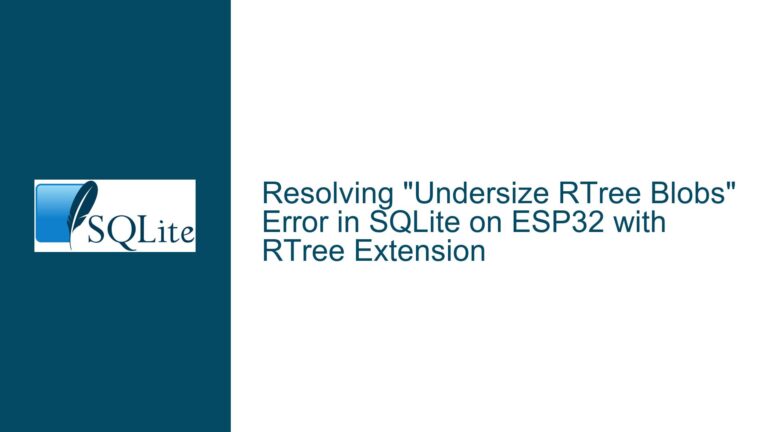Invalid Pointer in SQLITE_SCANSTAT_EXPLAIN Due to Trigger Execution
Issue Overview: Invalid Pointer in SQLITE_SCANSTAT_EXPLAIN During Trigger Execution
The core issue revolves around the SQLITE_SCANSTAT_EXPLAIN feature in SQLite, which is used to retrieve the execution plan explanation for a given SQL statement. Specifically, the problem occurs when attempting to access the explain text pointer returned by the sqlite3_stmt_scanstatus_v2 function. Under certain conditions, particularly when triggers or cascading delete operations are involved, the explain pointer is returned as an invalid memory address (e.g., 0x5 or other low-value pointers). This results in segmentation faults when the application attempts to dereference the pointer.
The issue manifests in the following context:
- The application uses
SQLITE_TRACE_STMTto trace SQL statements and retrieve their execution plans. - The problematic SQL statements involve
DELETEoperations that either trigger additional actions (viaAFTER DELETEtriggers) or haveON DELETE CASCADEforeign key constraints. - The
explainpointer is valid during the initialSQLITE_TRACE_STMTevent but becomes invalid in subsequent events for the same statement, particularly when the trigger or cascade logic is executed. - The issue does not occur during
SQLITE_TRACE_PROFILEevents, suggesting that the problem is tied to the timing or context of theSQLITE_TRACE_STMTevents.
The root cause appears to be related to how SQLite handles the explain text for nested or secondary statements generated by triggers or cascading operations. The explain pointer may point to memory that is no longer valid or is overwritten between trace events.
Possible Causes: Trigger and Cascade Logic Interfering with Explain Pointer Validity
Trigger Execution Context:
- When a
DELETEstatement triggers anAFTER DELETEtrigger, SQLite generates additional SQL statements to execute the trigger logic. These statements are treated as separate entities within the same execution context. - The
explainpointer for the originalDELETEstatement may be invalidated or overwritten when the trigger logic is executed, leading to invalid memory access.
- When a
Cascading Delete Operations:
- Similar to triggers,
ON DELETE CASCADEforeign key constraints generate additionalDELETEstatements to maintain referential integrity. - The
explainpointer for the originalDELETEstatement may not account for the cascading operations, resulting in invalid or stale pointers.
- Similar to triggers,
Memory Management in SQLite:
- SQLite manages memory for execution plans and
explaintext dynamically. If the memory allocated for theexplaintext is reused or freed between trace events, the pointer may become invalid. - The issue is exacerbated when multiple trace events are generated for the same statement, as the memory context may change between events.
- SQLite manages memory for execution plans and
Incorrect Parent-Child Relationships in Execution Plans:
- The
selectidandparentidfields in the execution plan are also affected, indicating that theOP_Explaininstructions may be missing or incorrectly placed. - This suggests a deeper issue with how SQLite constructs and manages execution plans for nested statements.
- The
Version-Specific Behavior:
- The issue was observed in versions prior to SQLite 3.42.0. A fix was introduced in the latest trunk version, indicating that the problem is related to specific memory management or execution plan handling logic in earlier versions.
Troubleshooting Steps, Solutions & Fixes: Resolving Invalid Explain Pointers and Improving Trace Event Handling
Upgrade to SQLite 3.42.0 or Later:
- The issue has been addressed in SQLite 3.42.0. Upgrading to this version or later should resolve the problem.
- The fix adjusts the pointers to point to the top-level program, ensuring that the
explaintext remains valid across trace events.
Workaround for Older Versions:
- If upgrading is not feasible, implement a workaround to detect and handle invalid
explainpointers:case SQLITE_TRACE_STMT: { sqlite3_stmt* stmt = (sqlite3_stmt*)P; char* unexpanded = (char*)X; int is_trigger = 0; if (unexpanded && unexpanded[0] == '-' && unexpanded[1] == '-') { is_trigger = 1; } if (is_trigger && sqlite3_libversion_number() < 3042000) { // Skip processing for trigger statements in older versions break; } // Proceed with normal processing } - This workaround skips processing for trigger-generated statements in versions prior to 3.42.0, avoiding the invalid pointer issue.
- If upgrading is not feasible, implement a workaround to detect and handle invalid
Enable Debugging Tools:
- Use tools like Valgrind or AddressSanitizer (ASan) to detect memory access issues and validate pointer usage.
- These tools can help identify the exact point where the
explainpointer becomes invalid and provide additional context for debugging.
Capture and Analyze Bytecode:
- Use the
bytecodevtabextension to capture the bytecode being executed for the problematic statements. - Analyze the bytecode to identify discrepancies in the
OP_Explaininstructions or memory management logic.
- Use the
Improve Trace Event Handling:
- Modify the application to handle multiple
SQLITE_TRACE_STMTevents for the same statement, particularly when triggers or cascading operations are involved. - Ensure that the
explainpointer is validated before dereferencing it, and handle cases where the pointer is invalid gracefully.
- Modify the application to handle multiple
Enhance Execution Plan Reporting:
- Request or implement enhancements to SQLite to provide more detailed information about nested statements, such as the depth of the execution frame or the specific trigger being executed.
- This would allow applications to distinguish between the original query and trigger-generated statements, improving performance analysis and debugging.
Test with Minimal Reproduction Cases:
- Create minimal reproduction cases to isolate the issue and validate the fix or workaround.
- Focus on scenarios involving
DELETEstatements with triggers or cascading operations, as these are the most likely to trigger the issue.
Monitor SQLite Development:
- Stay informed about ongoing developments and fixes in SQLite, particularly those related to execution plans, memory management, and trace events.
- Contribute to the SQLite community by reporting issues and sharing insights from debugging efforts.
By following these steps, developers can resolve the invalid pointer issue in SQLITE_SCANSTAT_EXPLAIN and improve the robustness of their SQLite-based applications. The key is to understand the context in which the issue arises, leverage available tools and fixes, and implement appropriate workarounds or enhancements as needed.






